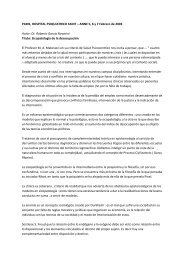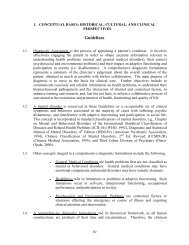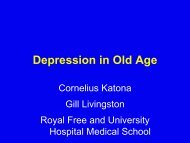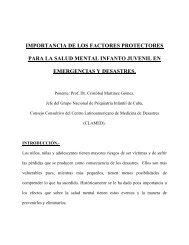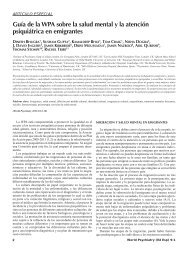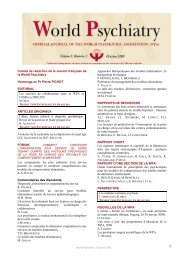ABSTRACTS - World Psychiatric Association
ABSTRACTS - World Psychiatric Association
ABSTRACTS - World Psychiatric Association
You also want an ePaper? Increase the reach of your titles
YUMPU automatically turns print PDFs into web optimized ePapers that Google loves.
trolled trials of treatments for the three acute mood episodes of bipolar<br />
disorder – mania, mixed states, and depression – and the prevention<br />
of symptomatic and syndromic relapses and recurrences of these<br />
mood states.<br />
TL9.<br />
MEDICAL BURDEN IN BIPOLAR DISORDER<br />
D.J. Kupfer<br />
Western <strong>Psychiatric</strong> Institute and Clinic, Pittsburgh, PA, USA<br />
From a world public health perspective, bipolar disorder is one of<br />
the ten most disabling conditions. In the last decade, several important<br />
issues have emerged: a) The increasing awareness that bipolar<br />
disorder is associated with a medical burden from both concurrent<br />
medical disease and the adverse potential effect of the treatments<br />
used for bipolar disorder; routine medical screening needs to be<br />
implemented. b) The ongoing lack of complete recovery and full<br />
restorative and functioning is associated with increased medical and<br />
psychiatric comorbidity; the regular use of psychosocial approaches<br />
is needed. c) The presence of risk factors including obesity, nicotine,<br />
and drug use accelerate an overall increase in morbidity and mortality.<br />
d) New comprehensive and integrated psychiatric/medical treatment<br />
approaches are needed. These recommendations are supported<br />
by data demonstrating that the increased medical comorbidity leads<br />
to slower treatment response of bipolar episode, especially depression,<br />
as well as earlier recurrence. The presence of the metabolic syndrome<br />
necessitates an integrated care model for bipolar disorder<br />
which seeks to positively influence modifiable medical risk factors,<br />
medical and psychiatric diseases, as well as to improve sleep/wake<br />
and social rhythms, and overall functioning. These customized treatment<br />
strategies include monitoring medical disease outcomes and<br />
medical risk factors. The following research and clinical questions<br />
emerge from current studies. How do we prevent acute illness from<br />
becoming chronic Can early intervention prevent “comorbid accumulation”<br />
And finally, how can we identify subgroups with circadian<br />
fragility or vulnerability as well as subgroups most “prone” to<br />
develop high metabolic risk profiles<br />
TL10.<br />
GETTING THE EVIDENCE FOR EVIDENCE BASED<br />
CARE OF DEPRESSION: HOW TO NARROW<br />
THE KNOWLEDGE GAP<br />
A.J. Rush<br />
Department of Psychiatry, University of Texas Southwestern<br />
Medical Center, Dallas, TX, USA<br />
Clinicians and their depressed patients make treatment decisions<br />
everyday, which rest on the answers to critical clinical questions based<br />
more on “best guesses” than on empirical evidence in many instances.<br />
For example, how long should a patient be treated to determine that<br />
remission will not occur Which clinical features, if any, recommend<br />
one treatment over another Yet, answers to these critical questions<br />
profoundly affect both how treatment is delivered and its outcomes.<br />
This paper highlights and prioritizes these clinical questions and the<br />
available evidence to address them. The limitations both in what we<br />
know now and in how we gather evidence to answer better these<br />
questions in the future are discussed. Changes in how we report<br />
research results to better inform clinicians are also suggested. In addition,<br />
suggestions to revise our current practice procedures in order to<br />
get more valid answers to these questions in more rapid and effective<br />
ways are provided. The potential value of widely implementing measurement-based<br />
care, a uniform outcome recording system, and in<br />
establishing simple patient registries to address several of these issues<br />
is discussed. Finally, new clinically useful and “patient friendly” study<br />
designs illustrate potential ways to gather the evidence that we so desperately<br />
need to put valid evidence into evidence-based care.<br />
UPDATE LECTURES<br />
UL1.<br />
HOW DO WE CHOOSE MEDICATIONS<br />
FOR PSYCHIATRIC PATIENTS<br />
R.J. Baldessarini<br />
Harvard Medical School and McLean Hospital, Belmont,<br />
MA, USA<br />
Most psychotropic drugs are palliative and not highly selective for<br />
particular disorders: “antipsychotics” are excellent antimanics, most<br />
“antidepressants” could as well been labeled “anxiolytics”, and drugs<br />
for epilepsy are used for mood disorders. Most are selected by a mix<br />
of addressing syndromes and symptoms. Research findings have a<br />
limited impact on practice. Current clinical research is highly industrial,<br />
oriented more toward licensing and marketing than questions of<br />
interest to clinicians and patients, and innovation plus marketing<br />
strongly influence drug choice. Clinical consideration of specific<br />
treatments typically focuses first on what is relatively simple to use<br />
and acceptable to patients: a need for regular medical monitoring or<br />
blood tests is a potent disincentive, given simpler or safer options. As<br />
examples, tricyclic antidepressants were displaced by the easier-touse,<br />
but not more effective, selective serotonin reuptake inhibitors;<br />
lithium nearly disappeared in the US as seemingly simpler, safer anticonvulsants<br />
and antipsychotics became available, and easily-used<br />
valproate displaced lithium even without long-term research support<br />
or regulatory approval for prophylaxis. Regional and national differences<br />
in drug choices suggest effects of culture or training, including<br />
marketing influences of “thought leadership”, and even fads. Confusion<br />
also is generated by plastic, market-oriented terms such as<br />
“major depression”, “antidepressant”, and mood stabilizer. Notably,<br />
depressive features of bipolar disorder are commonly conflated with<br />
unipolar major depressive disorder, even though the syndromes are<br />
very different and require dissimilar treatments, although they are<br />
very commonly treated with “antidepressants”.<br />
UL2.<br />
PSYCHOTHERAPIES: WHAT WORKS FOR WHOM<br />
P. Fonagy<br />
University College London, London, UK<br />
Sixty years of research have established psychological therapies as an<br />
effective part of our therapeutic armamentarium of psychiatry in<br />
work with most mental disorders. This paper reviews the indications<br />
for specific types of psychological therapy for all common mental disorders<br />
including the psychoses, non-psychotic disorders and Axis II<br />
disorders. There is also an accumulating body of evidence that suggests<br />
psychological interventions in the context of prevention of mental<br />
disorder. However, while there appears to be no shortage of potentially<br />
effective interventions, we are not much closer to being able to<br />
answer the question: “What is most likely to work for whom” in<br />
3




